Future Experiences:
The Transient State + Plastibank
Project Length: 8 Weeks
Roles: Design Research, Speculative Designer, Human Centred Design
Part One:
The Transient State
Part One:
The Transient State
Project Length: 3 Weeks
Teaming up with
Sustainable Futures in Africa (SFA)
Sustainable Futures in Africa (SFA)
"The conventional methods of money is an obstacle in the Global South"
The project launched with an introduction and overview of where the project would be taking place and who our stakeholders were.

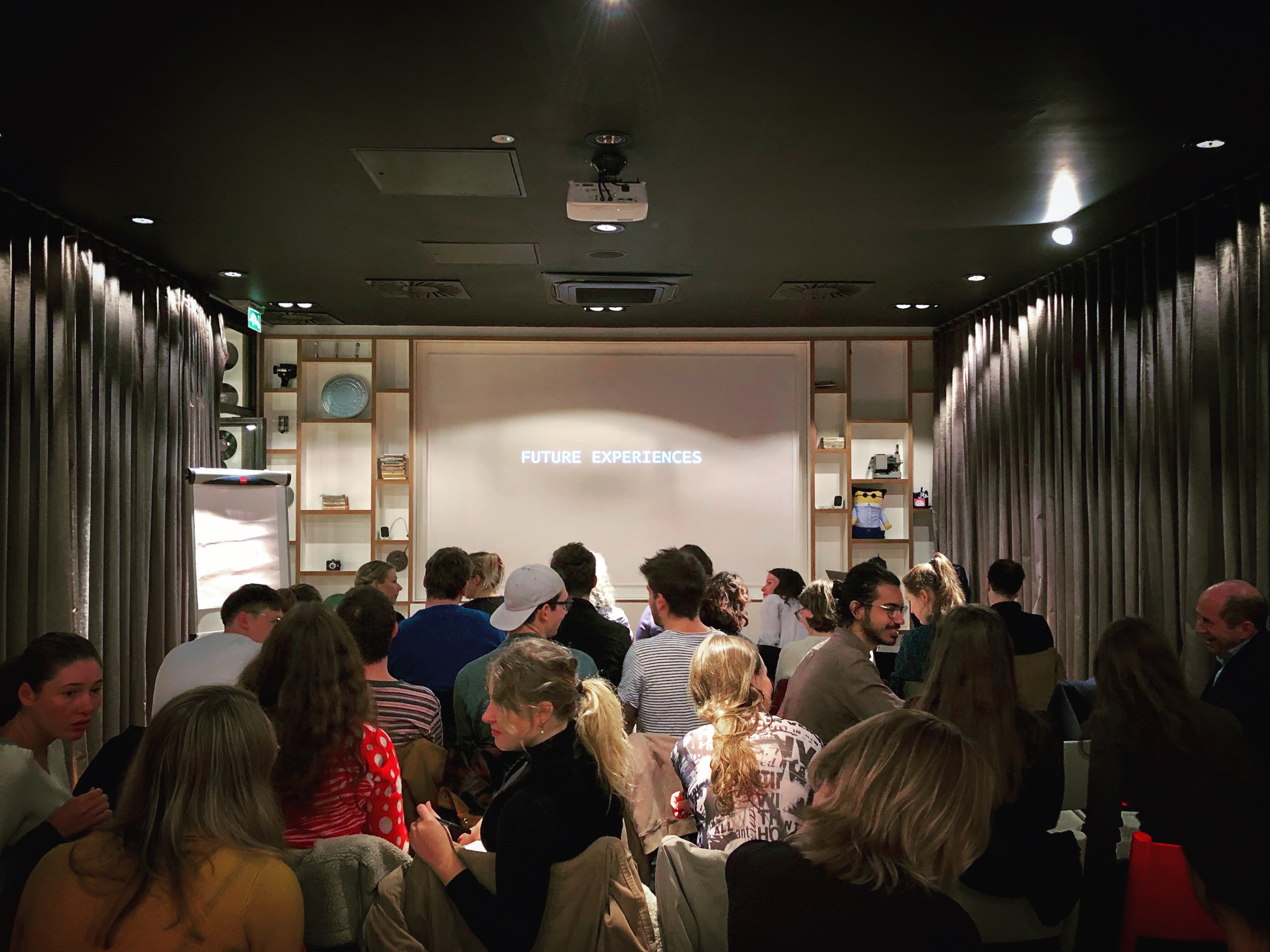
Future Trend Research
The beginning of this project involved us breaking into groups of four to which we were given a domain to design for. In our case the domain we were given was economies. The research we conducted during the first two days of the project gave us a running start into the workshop we would be participating in at the end of the week with Studio Andthen where our collated research is crucial to develop ideas and scenarios for our future world.






'Unintended Consequences'
with Studio Andthen
Unintended consequences is a futures thinking workshop created by Studio Andthen. It looks at how design interventions can have repercussions in both a positive and negative outcome.
The workshop began by taking our STEEEVPLE cards and asking ourselves what would happen if that existed. We would then sketch and note down the consequences of that action and lay them out on the table.
When learning about this workshop concept it was interesting to see the amount of consequences that can be generated for a single design intervention. This thought began to weigh heavily in my decision making from then onwards.

Stage 1: Initial Consequences

Stage 2: Developed Consequences

Stage 3: Further Developed Consequences
Decisions, Decisions...
The Context
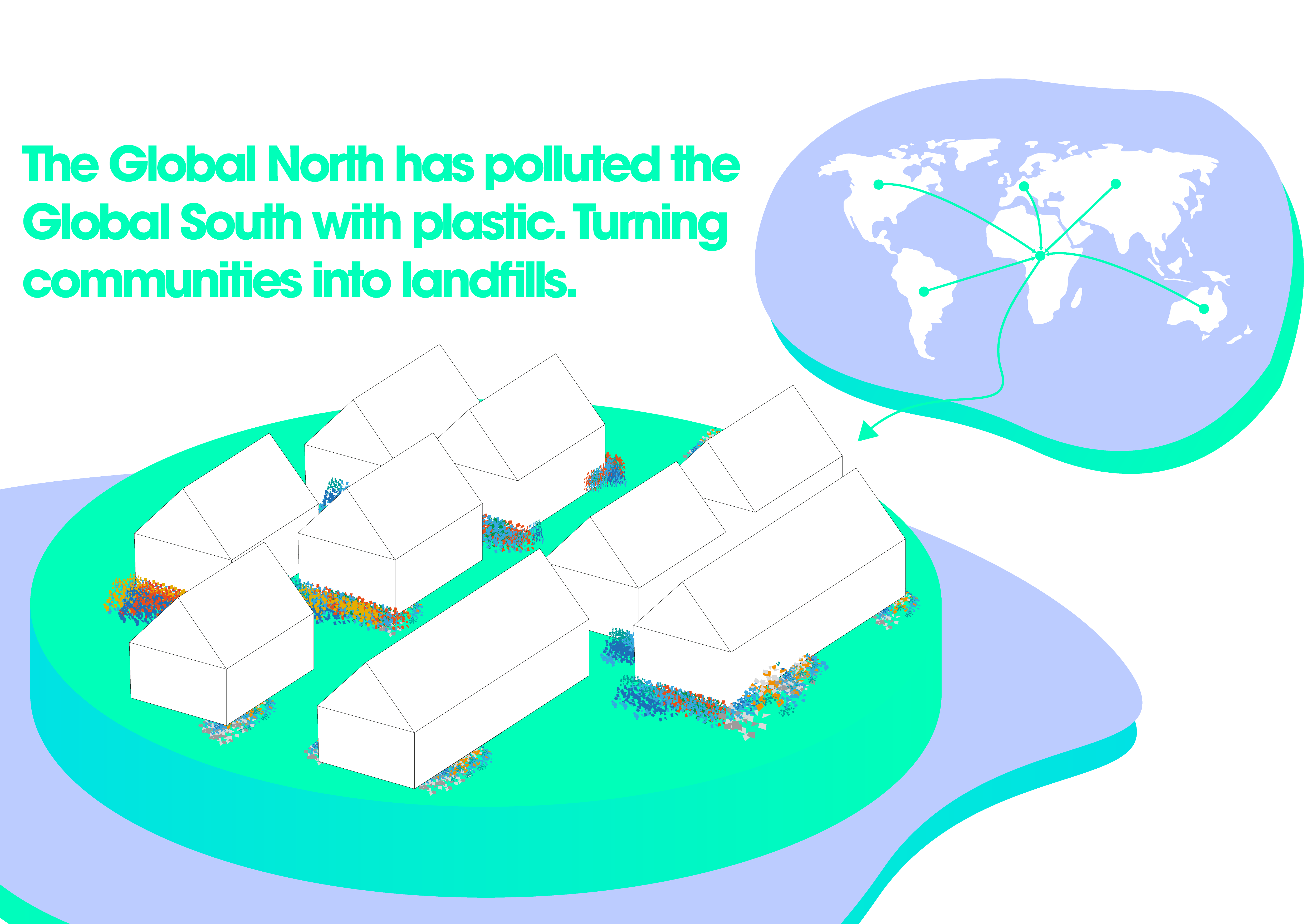 Plastic pollution is rife throughout the Global South. It has become the Global North’s dumping ground. Communities have become landfill sites where both people and environment suffer. Currently there are many countries and villages extracting valuable materials from these landfill sites however, at great cost to their health and of the surrounding environment due to the toxic fumes encountered when excavating these materials. Furthermore, the individuals involved in the removal of materials are exploited as they are paid a miniscule amount when they deposit their collection to material suppliers. This is where we as a group decided to intervene and find a way to empower the individuals and communities affected by both The Global North’s actions and plastic pollution.
Plastic pollution is rife throughout the Global South. It has become the Global North’s dumping ground. Communities have become landfill sites where both people and environment suffer. Currently there are many countries and villages extracting valuable materials from these landfill sites however, at great cost to their health and of the surrounding environment due to the toxic fumes encountered when excavating these materials. Furthermore, the individuals involved in the removal of materials are exploited as they are paid a miniscule amount when they deposit their collection to material suppliers. This is where we as a group decided to intervene and find a way to empower the individuals and communities affected by both The Global North’s actions and plastic pollution.
Future Scenarios
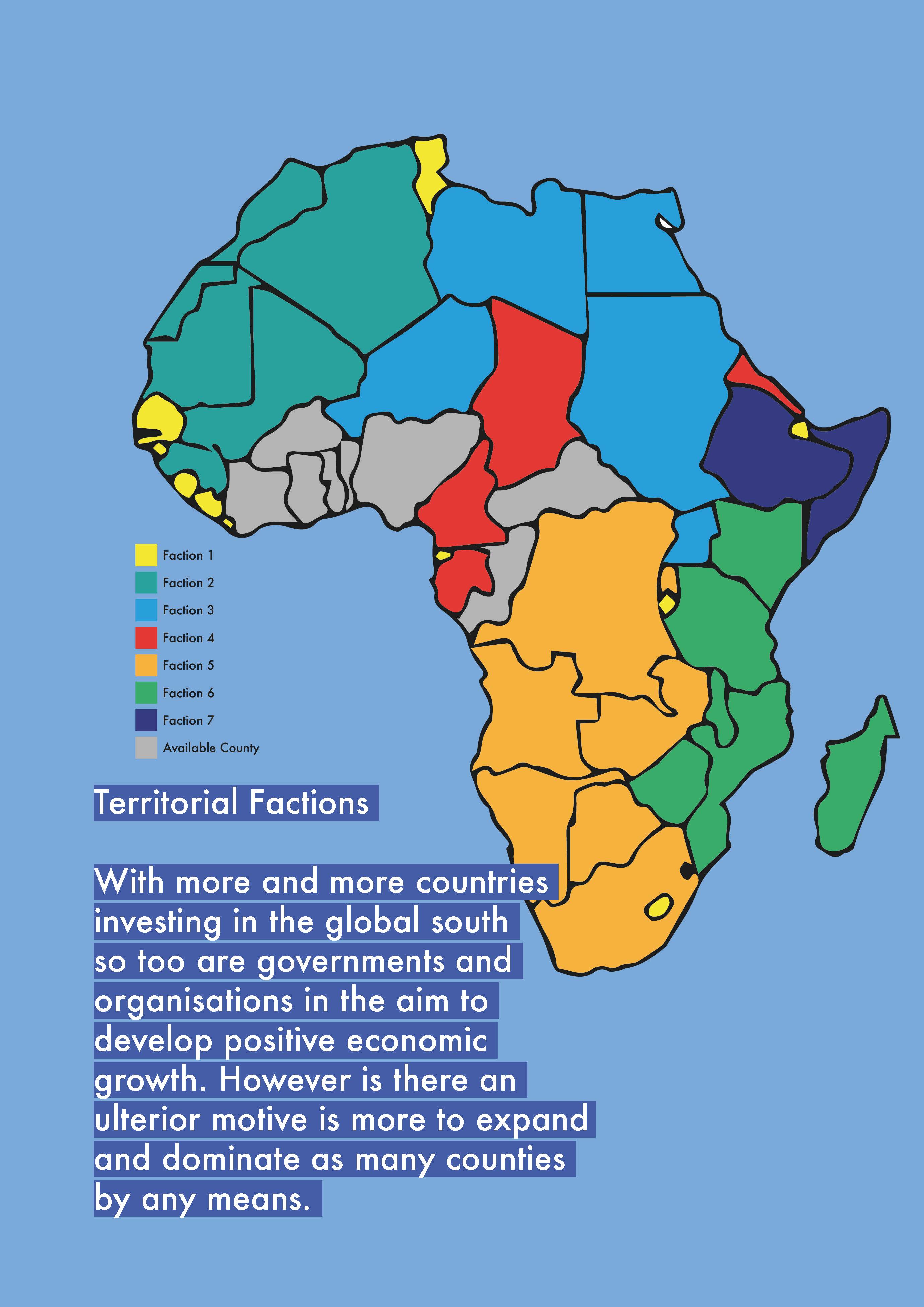
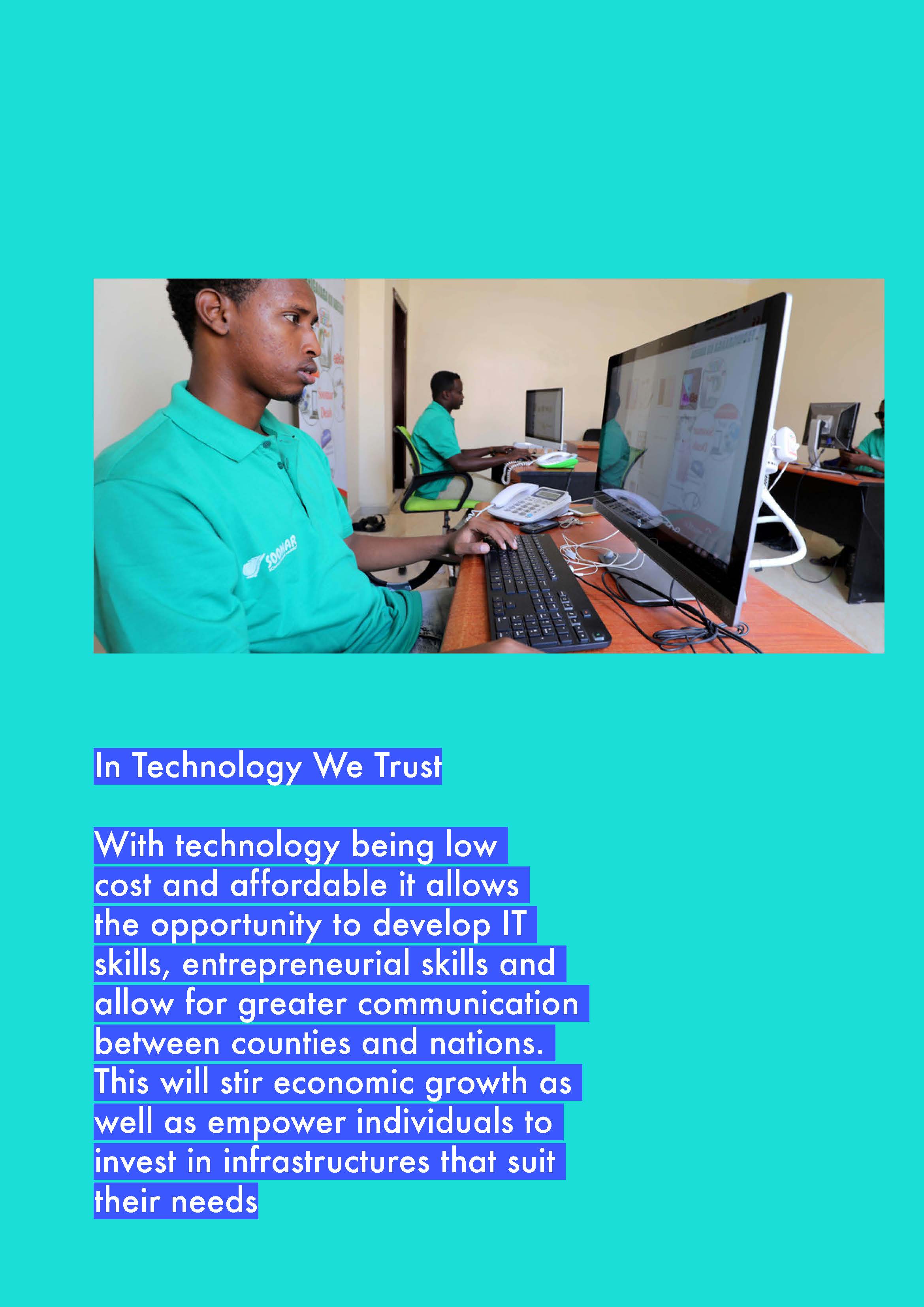
 Created by Holly Zambonini
Created by Holly Zambonini Created by Rosie McKenzie
Created by Rosie McKenzie Created by Rosie McKenzie
Created by Rosie McKenzie
The workshop with Studio Andthen was a fast paced but incredible experience. The amount of work we had produced in a day in a half was staggering and showed us what we are really capable of. The tasks themselves were fun and informative with each intended learning outcome clearly explained and conveyed.
The workshop helped us start to flesh out our initial research from a macro viewpoint to a micro granular lens. The incredible pace of the workshop forced us to make quick decisions while also allowing us to really understand what the consequences of sustainable development would be in the Global South. The tasks in this workshop will be something I will replicate myself when working on my self initiated project as the result speak for themselves.
Following Studio Andthen’s workshop we follow into another workshop this time run by Brian Proudfoot director of GOOD in which we start to materialise our research and key scenarios into physical models.
Brian Proudfoot's workshop looked to materialise our research and work from the previous workshop with Studio Andthen to help create a first draft of what our future world exhibit would look like in preparation for our first expert input day.
The workshop with Brian Proudfoot allowed us to materialise our desk research into a tangible porous future exhibition. Although it was an initial draft it was an important stepping stone to materialise our research and our vision of our future world for the expert input day.








Expert Input Session One
"Future planning is difficult when you are surviving day to day"
- Diarmuid O’Neill






Reflecting on the day
While day was nerve racking the knowledge and experienced gained was priceless. It was nice to meet such welcoming experts being excited by a new perspective of an issue they have been tackling for most of their career. The responses for our future world were entirely positive stating that the QR coded chocolate bar is a brilliant way to show the journey of a product goes through.
Areas of improvement included thinking about the individuals experience in this world as we had effectively illustrated the larger context we needed to look at the granular interactions that you would find in our scenarios.
The expert input day was non stop but incredibly enjoyable as we gained a great deal of knowledge in just three hours. Overall the day was a huge success and we were excited for what comes next.
The Transient State
With the cumulative research from the STEEEVPLE cards, Studio Andthen’s workshop, Brian Proudfoot's workshop and the input from the experts we created a future world called The Transient State.
The Transient State is the future for sustainable development in the Global South. As nations join together and prosper from each other sharing knowledge and resources for a better world.
The Values
A combined accountability for ourselves, each other and our surroundings.
Transparency in our society and freedom of information.
Community values at the heart of every decision.
Co operation with our neighbours to our nations.
The natural preservation of resources is critical to the preservation of our nation.
Redefining Economics
Economics is no longer about consumption of goods and services. The economy relies on sustainable development and natural preservation.
Money and Gross Domestic Product no longer dictate the progress of a community; communities look at what is valuable to them in different terms and create new value systems and alternative currencies based on sustainability, transparency and co-operation.
The Products
The Droplet
The droplet has stored topographic and local knowledge to help locate local water sources.
Simply by bowling the product across the ground the tip will point you in the direction of where there is water.
Simply by bowling the product across the ground the tip will point you in the direction of where there is water.
This provides necessary information for communities or individuals where water is scarce or is in desperate need.


The Soil Analyser
This product measures the soil in a chosen area. Simply by
placing a small amount of soil on the analyser it will scan and analyse the sample.
Afterwards important information on the soil will be presented stating if there are any contaminates in the sample, what those contaminates are as well as inform of any suitable seeds that could be grown in the area.
placing a small amount of soil on the analyser it will scan and analyse the sample.
Afterwards important information on the soil will be presented stating if there are any contaminates in the sample, what those contaminates are as well as inform of any suitable seeds that could be grown in the area.
This allows the community and individuals the necessary information to farm and prosper from their land.


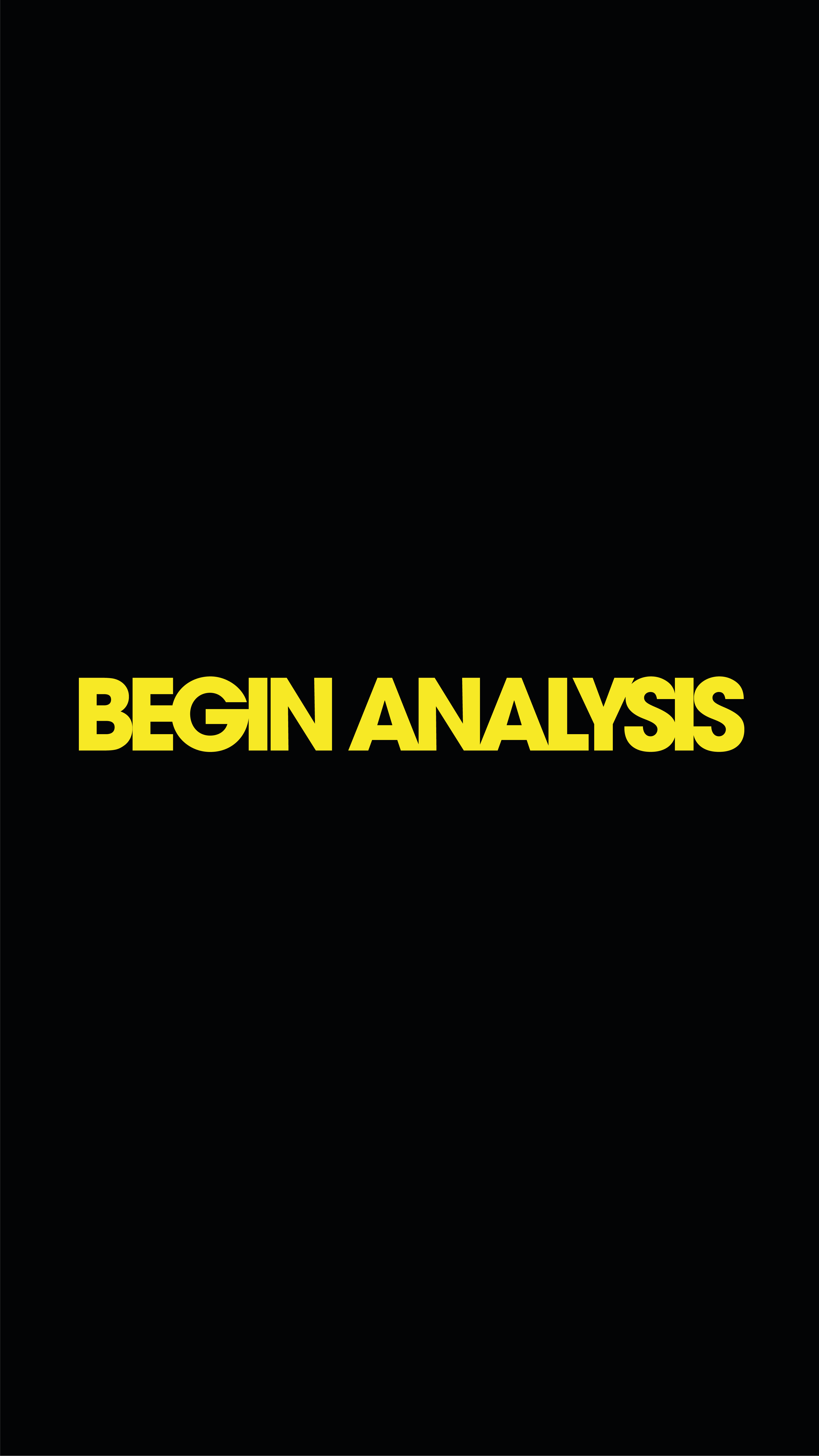
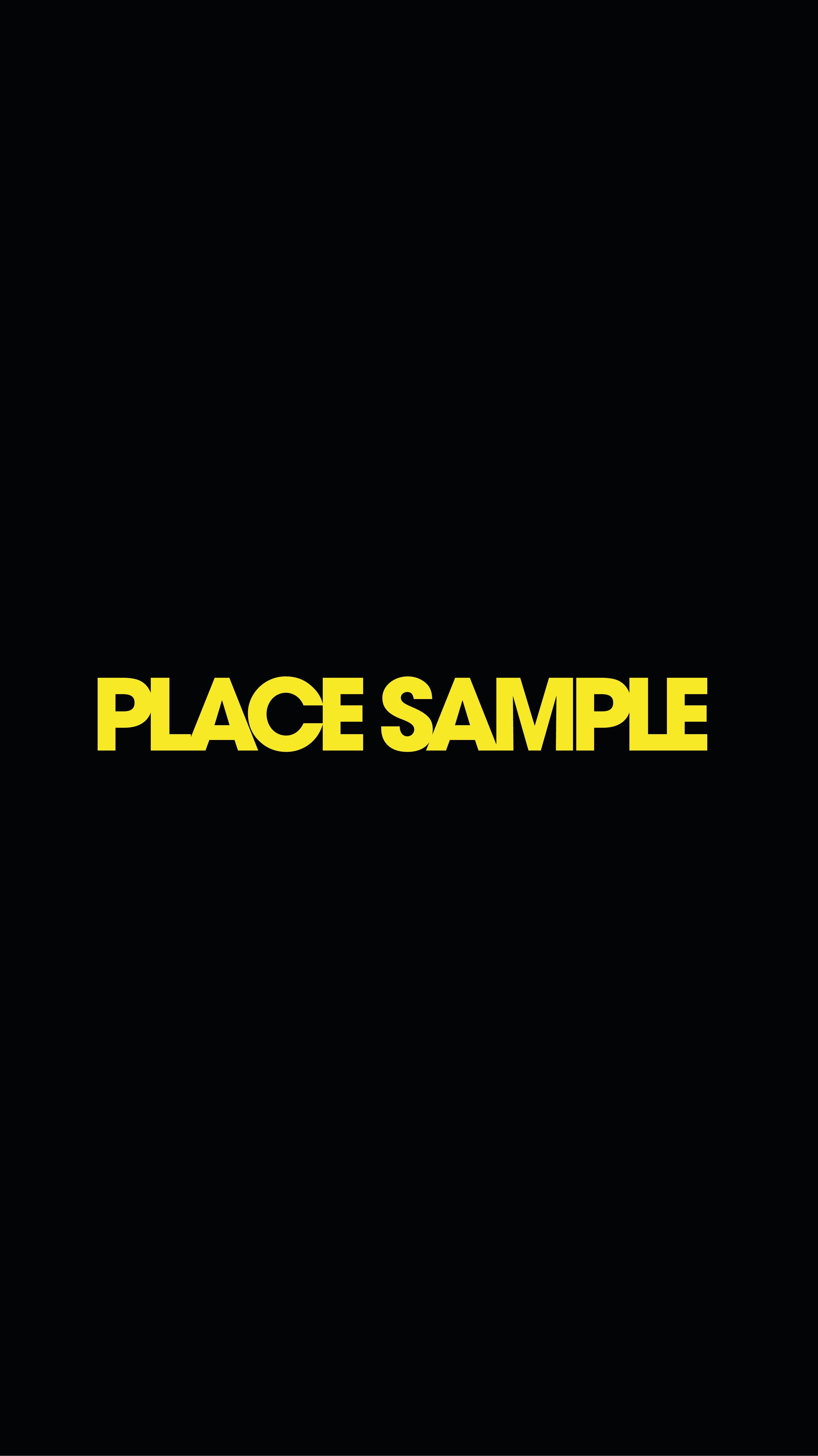

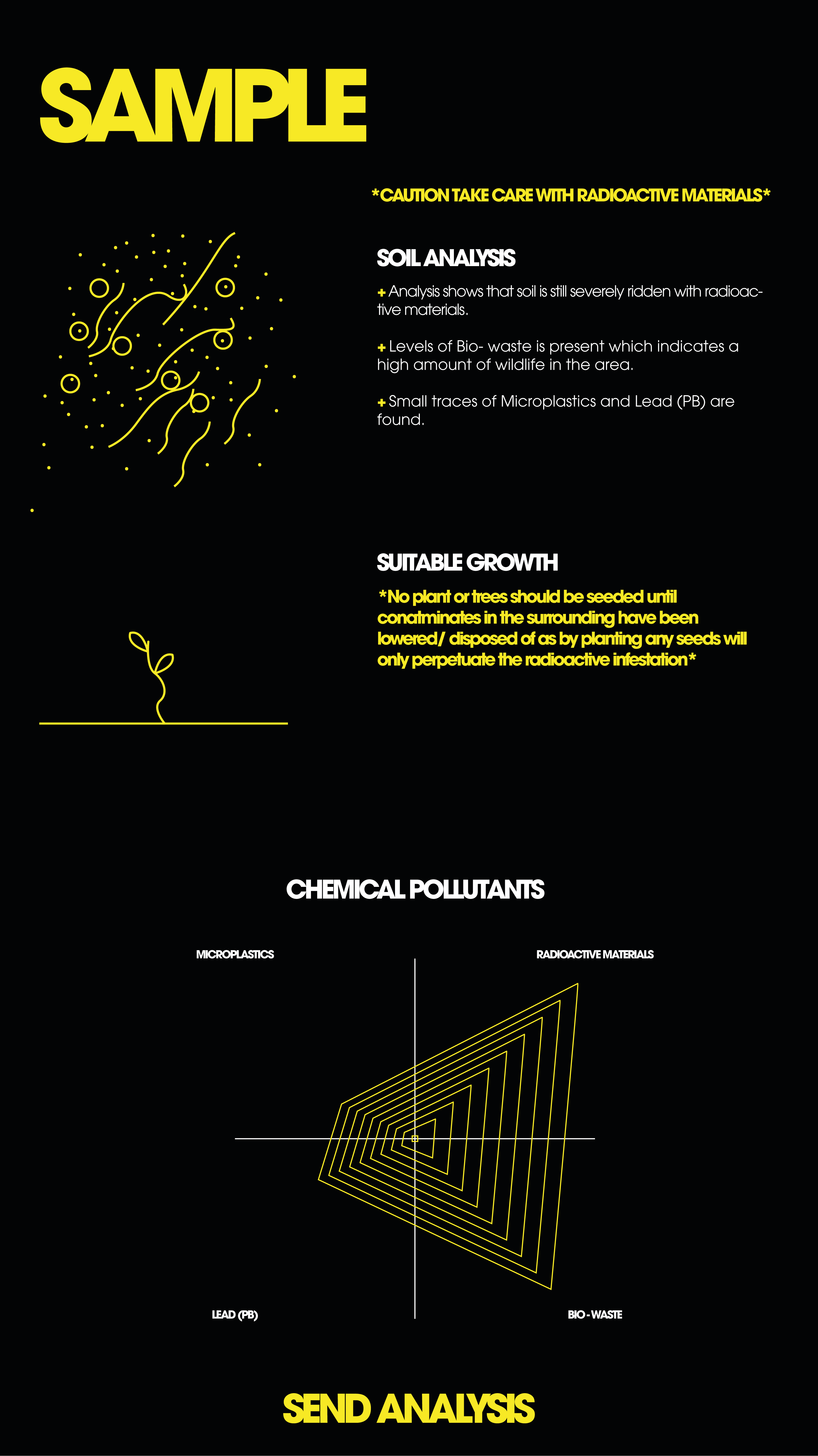
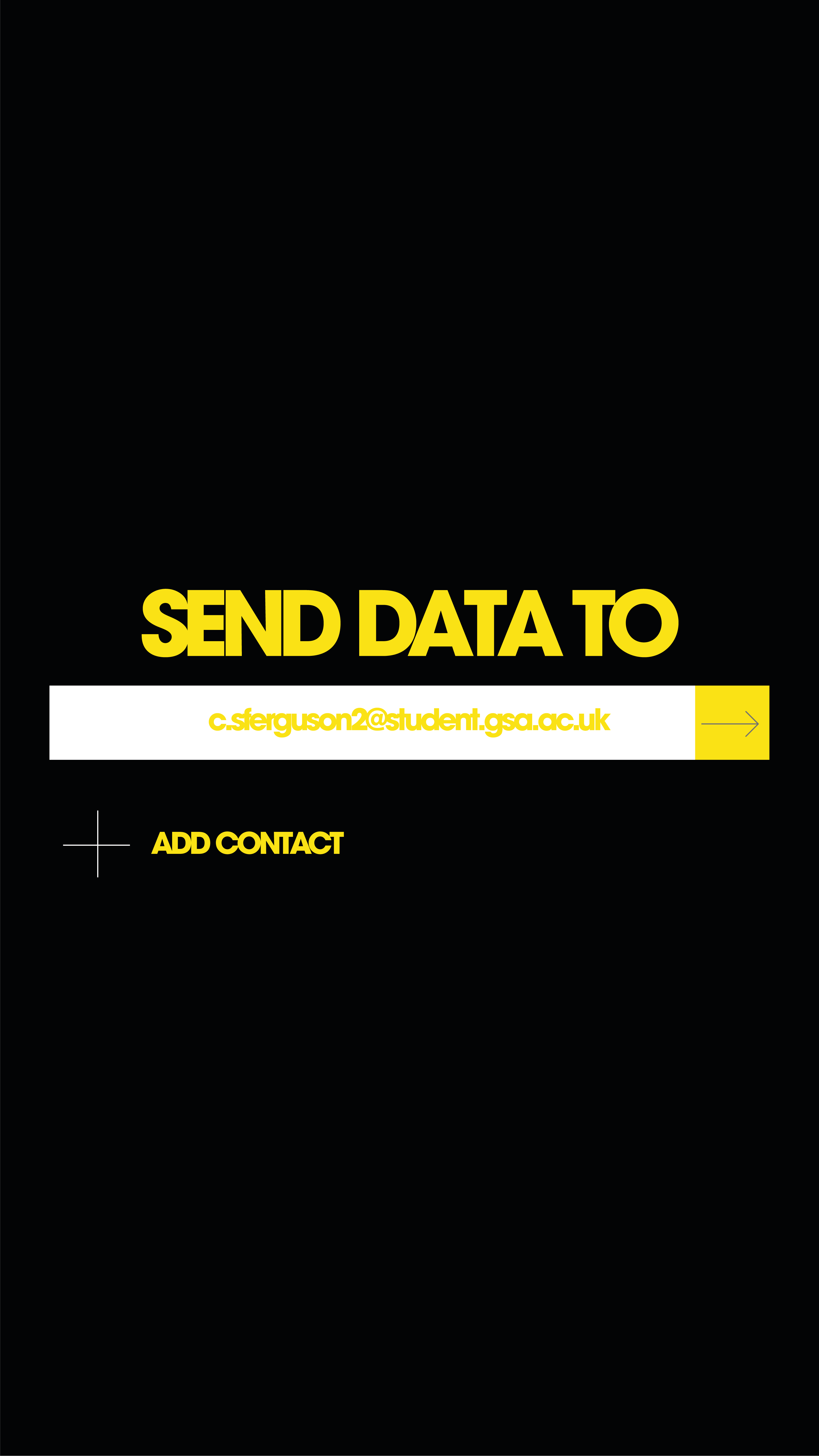
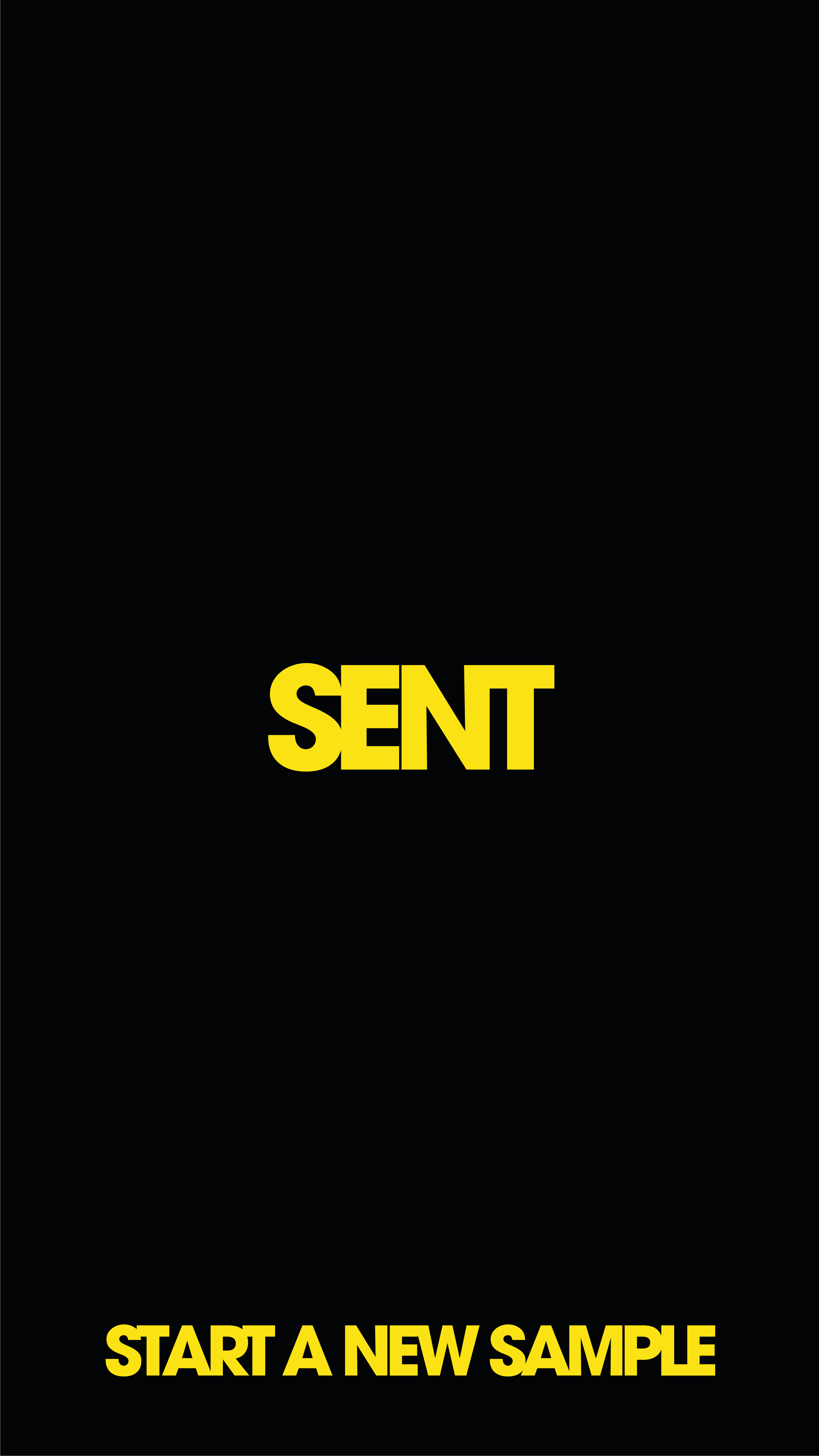
Natures Accounts
In the past, our essential knowledge of the trees, forest and animals has dwindled and we began to lose many of the forest’s magical cures and properties.
10 years ago 25% of current medicines were derived from the rainforest, yet it was being destroyed at an unprecedented rate.
10 years ago 25% of current medicines were derived from the rainforest, yet it was being destroyed at an unprecedented rate.
Nature’s accounts is designed to document all of the human knowledge we still have of the rainforest and harness it for good.


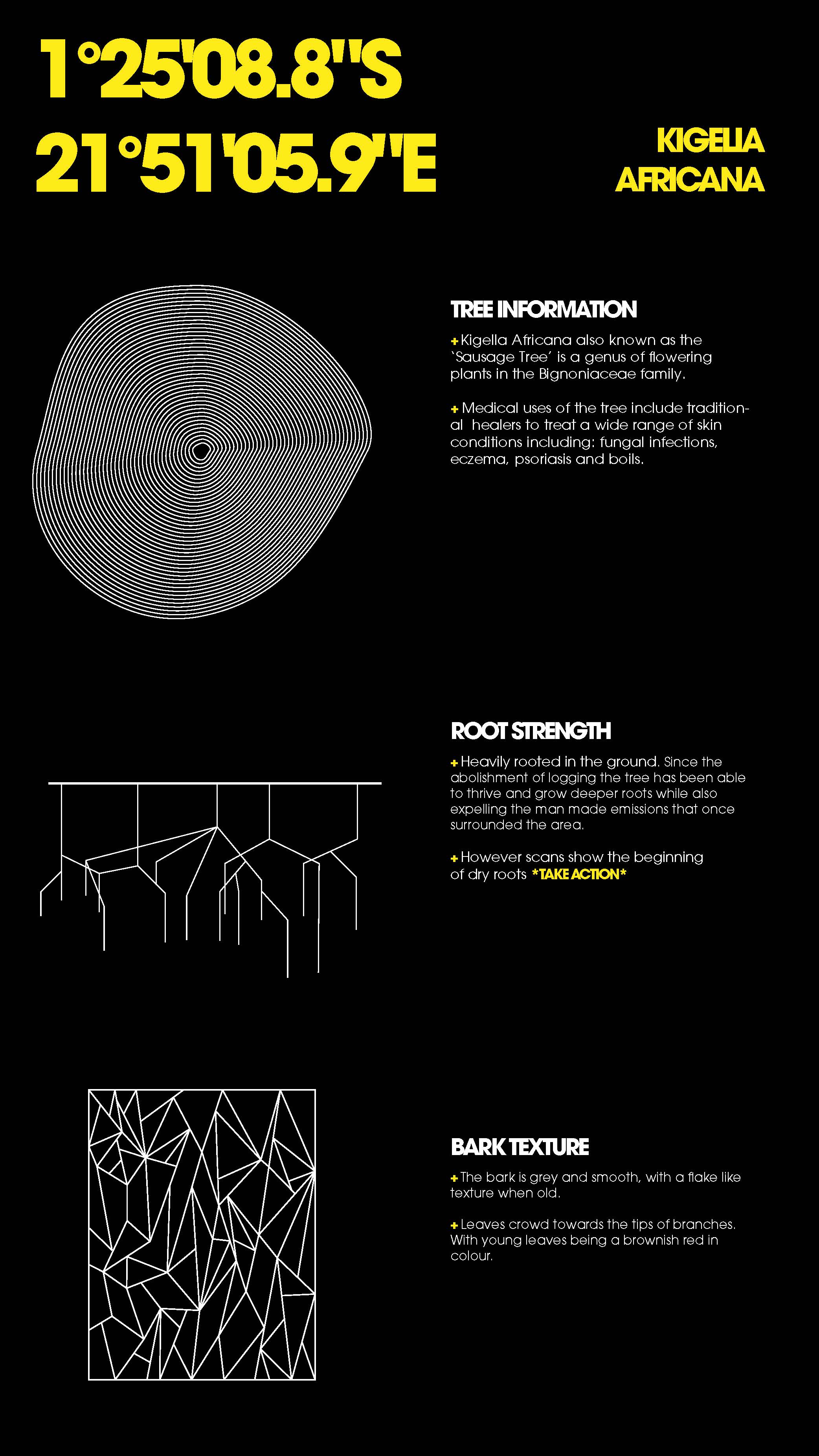


The Future World Exhibition










End of Part 1
The main points we wanted to convey during the presentation was that these objects are to empower the community and the individual. This intervention did not want to follow in the footsteps of failed projects before as there are too many examples of the Global North dominating the decision making with the best interests only to lose site as to what communities in the Global South actually want and need.
The simple plinths help highlight the products and with the added bonus of the objects being interactive we found that the viewers understood and really enjoyed our presentation as they could physically interact with the different products.
Part 1 of this project was fast paced and challenging. The non- stop rush involved having to complete tasks in a short timeframe but with a highly polished outcome, be it research, presenting or creating the exhibition itself. Communication was incredibly important aspect of this part of the project, as well as the need to trust group members when delegating each other tasks. The only area I believed we needed to improve, as mentioned by our peers and tutors, was the connection between the products and where our design intervention sits within the Global South and the Global North. This train of thought stood by me for the rest of the project.
Part Two:
Plastibank
Plastibank
Project Length: 5 weeks
'Unintended Consequences' Part Two
with Studio Andthen
Prior to the workshop, we had to create up to five scenario concepts that related to our future world. The concepts involved looking at the micro interactions for example:
What are the necessary steps for two or more countries to become a transient state, How does one country ask for help in terms of developing infrastructure and construction, how do certain states turn their waste resources into a new form of economy.
From these concept scenarios we were tasked to create personas that would live in these worlds. The personas created were The Explorers, The Networkers and The Exchangers. After I created the personas I realised that while the personas were created separately to live in their separate worlds however each persona can work with the other in particular The Explorer and The Exchanger. However this was still in the early stages and so to jump straight to development would harm the final outcome of the design.



Prototyping using Film
After creating our videos we would then screen followed by explaining the concept direction we are going through.
The filming was a great exercise in visualising our concepts through a fun and informative workshop. Not only did it help myself find a way to explain the concept but it was an effective method to explain the idea clearly to both my peers and tutors.
https://vimeo.com/419050907
Watch the video here:
https://vimeo.com/419050907
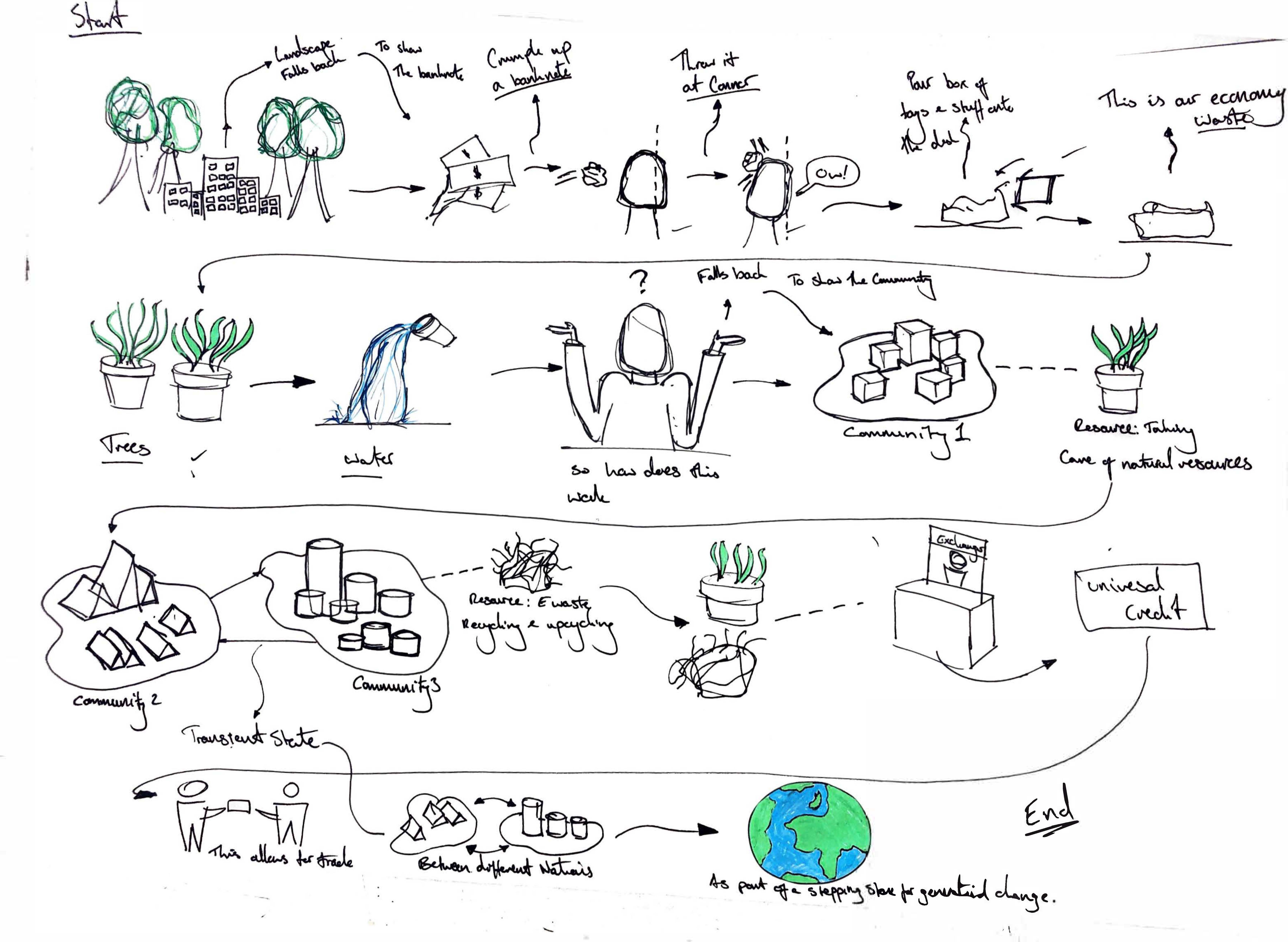



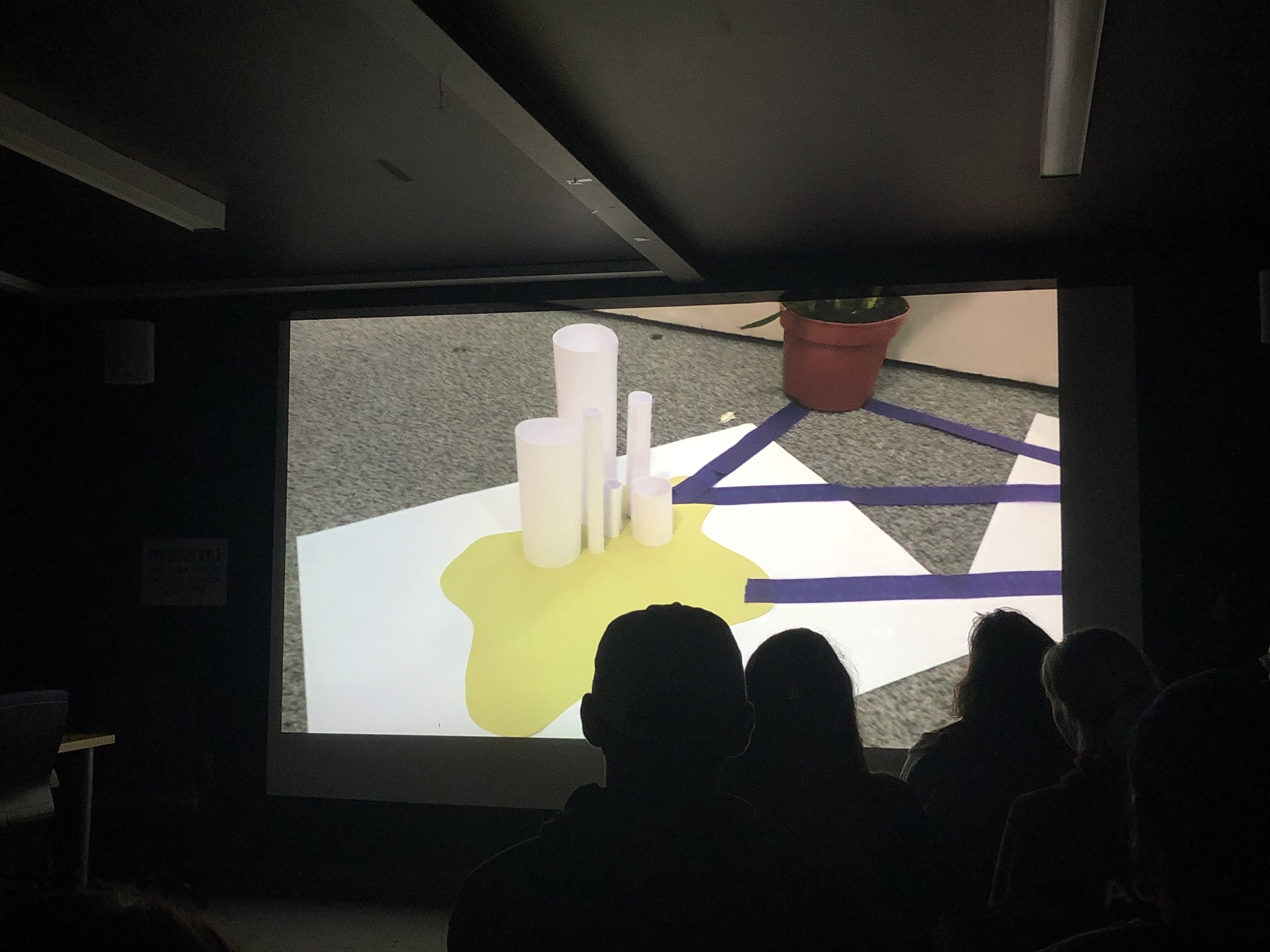
Expert Input Session Two



Reflecting on the day
The second input day was a more challenging exercise as it we were justifying our design decisions to experts who had no seen the amount of work we had done since the meet up. To overcome this challenge we as a group created a research folio of all the work we had done up until that point. We were happy to say that it worked effectively as the experts had a tangible resource to look back to.
The feedback for myself was to examine and identify the micro moments within my concept as I had primarily thought of the bigger picture. This feedback was enough to begin further developments and corrections.
While the second expert input day was far more challenging than the first, it was good practice and a reality check as we would be facing the same difficulties in industry after graduation.
Design Opportunity & Direction -
The Exchange Machine
The Exchange Machine will weigh the specified shredded plastic, analyse its worth by checking it against the ‘Material Stock Market’ and will finally supply a value to the user. The credits will then be transferred to the users card and stored on the individuals account.
Below are initial sketches of the exchange machine through to user interaction and journey maps to sketch modelling and CAD modelling. Each stage helped further develop and refine not only the look of the product but its functionality and its impact on the user in both a micro and macro viewpoint.

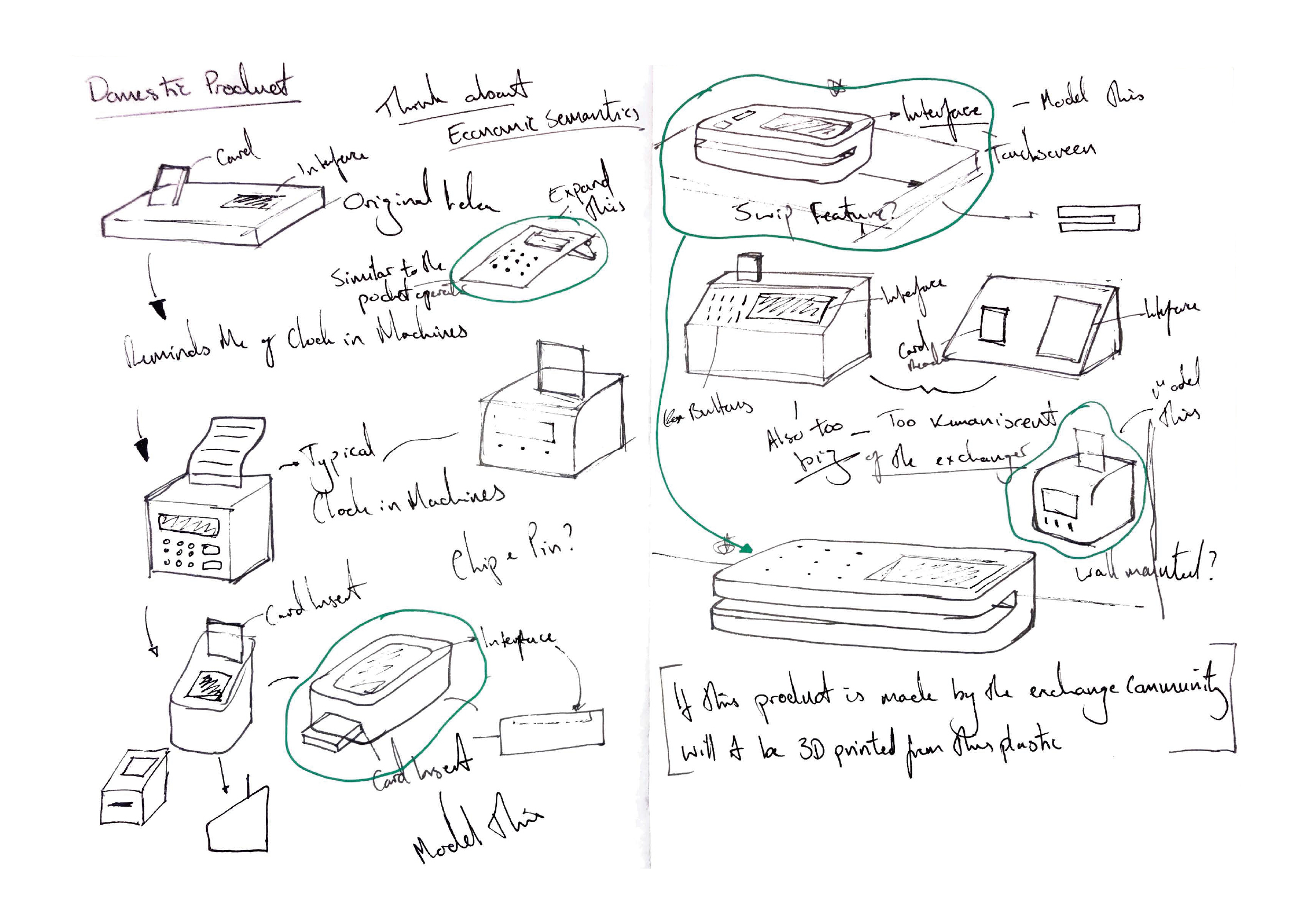
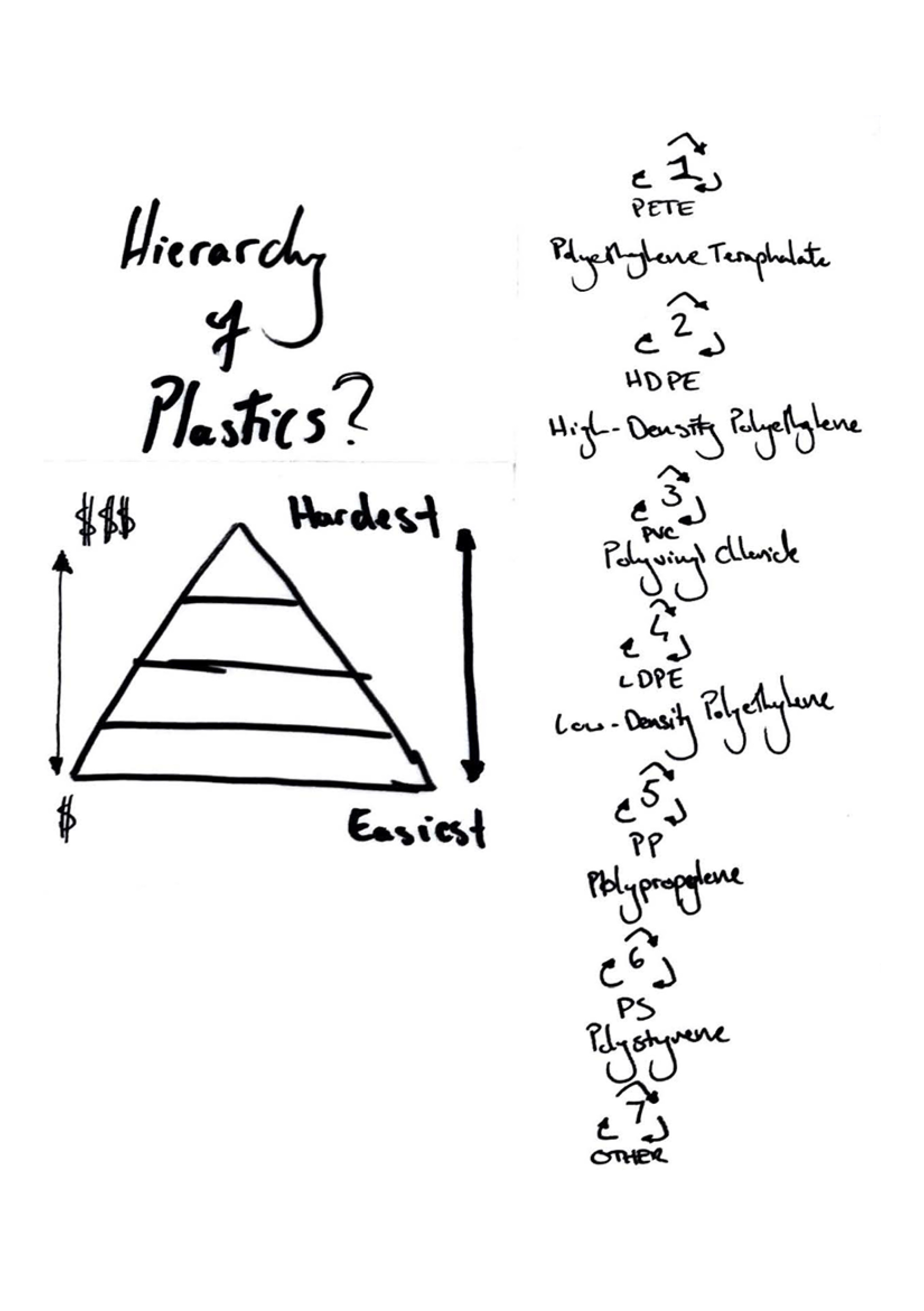
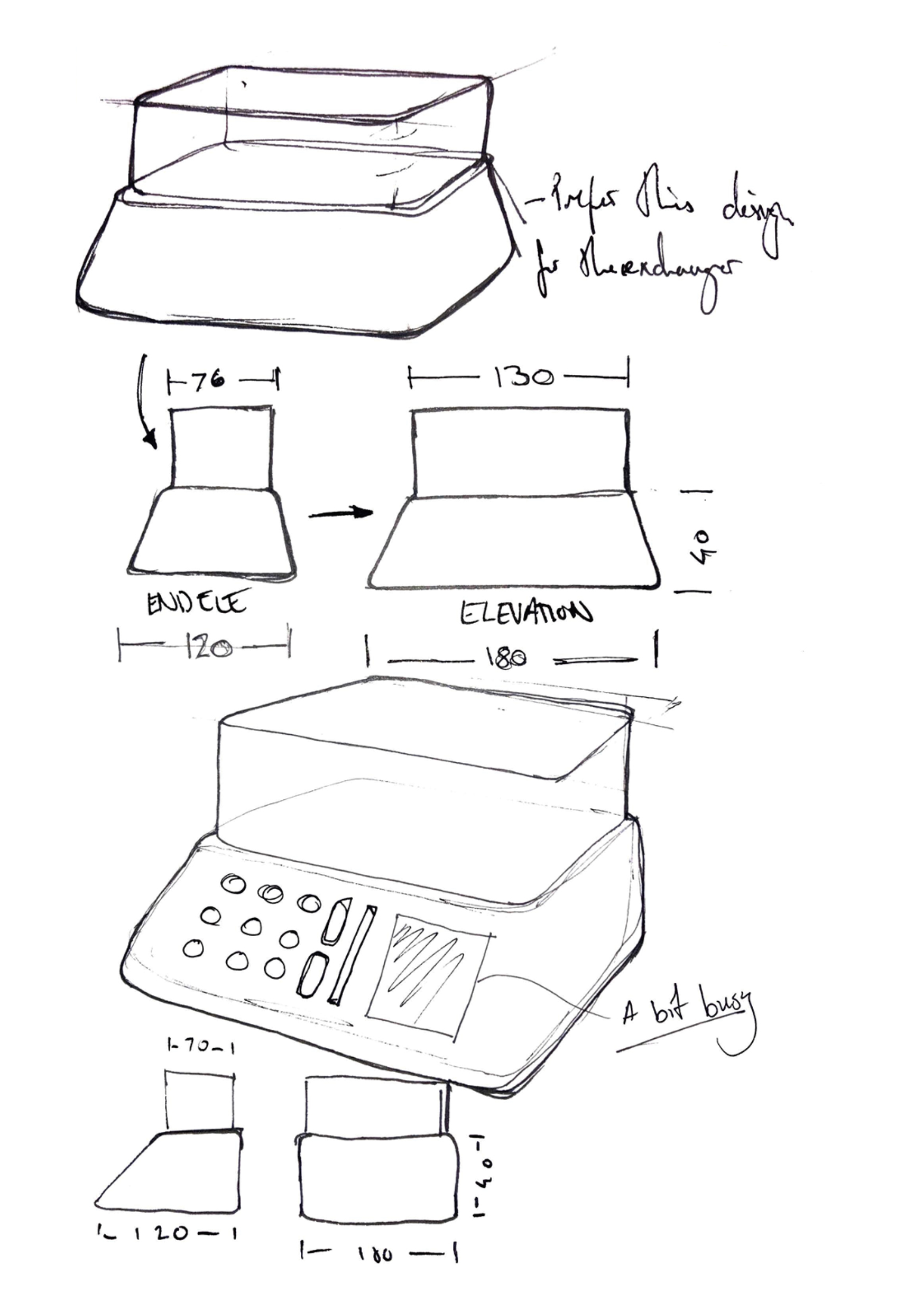
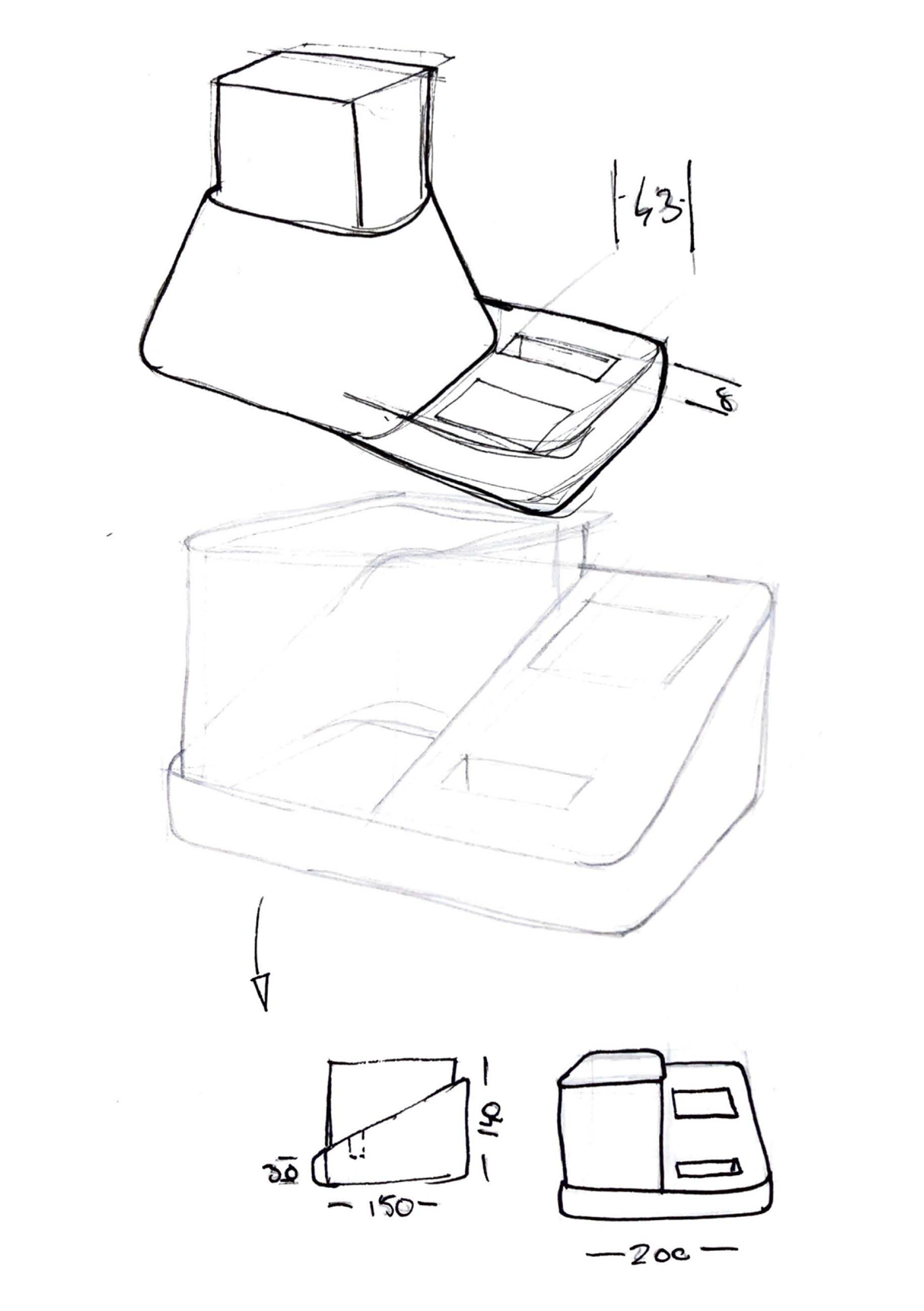

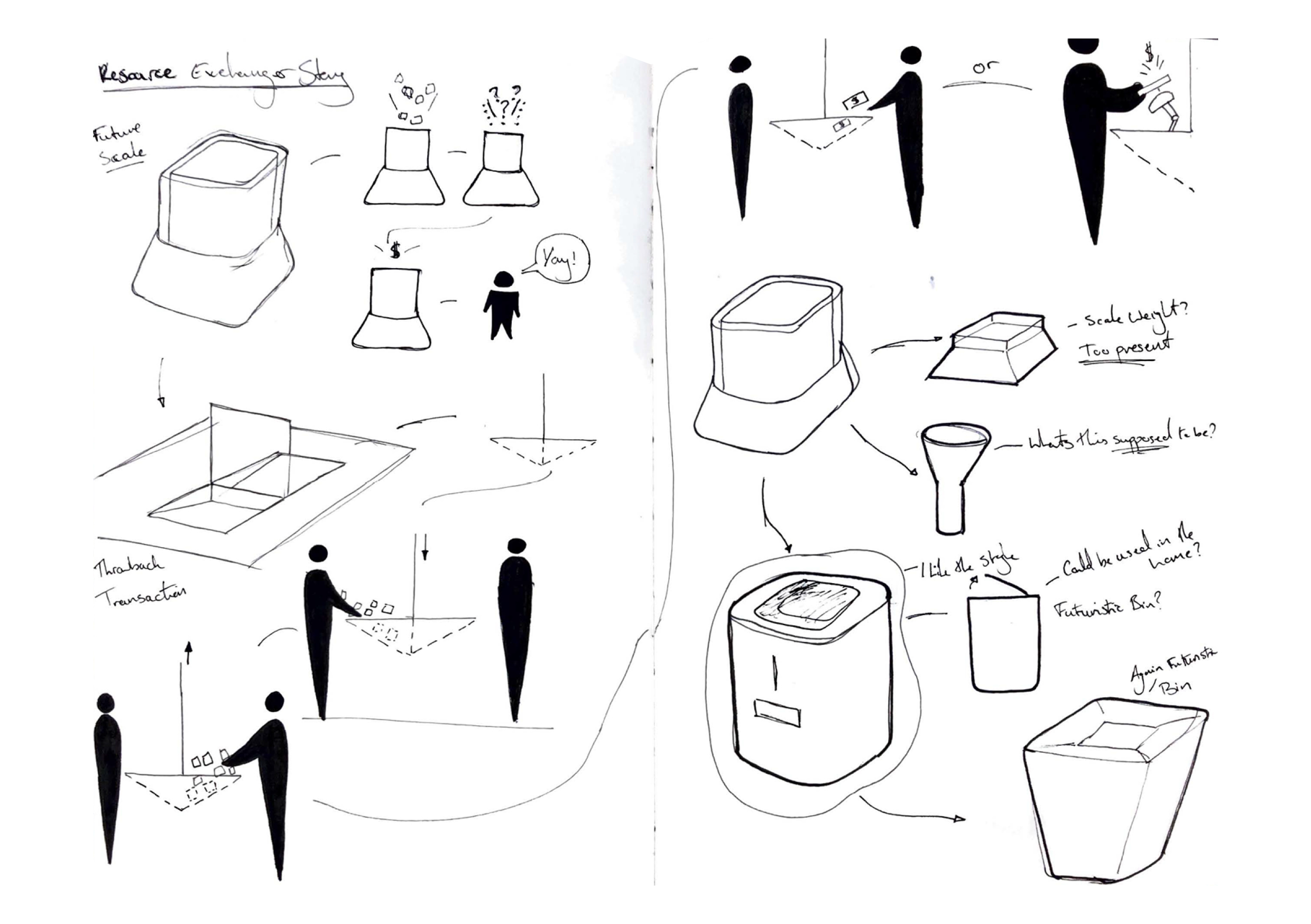
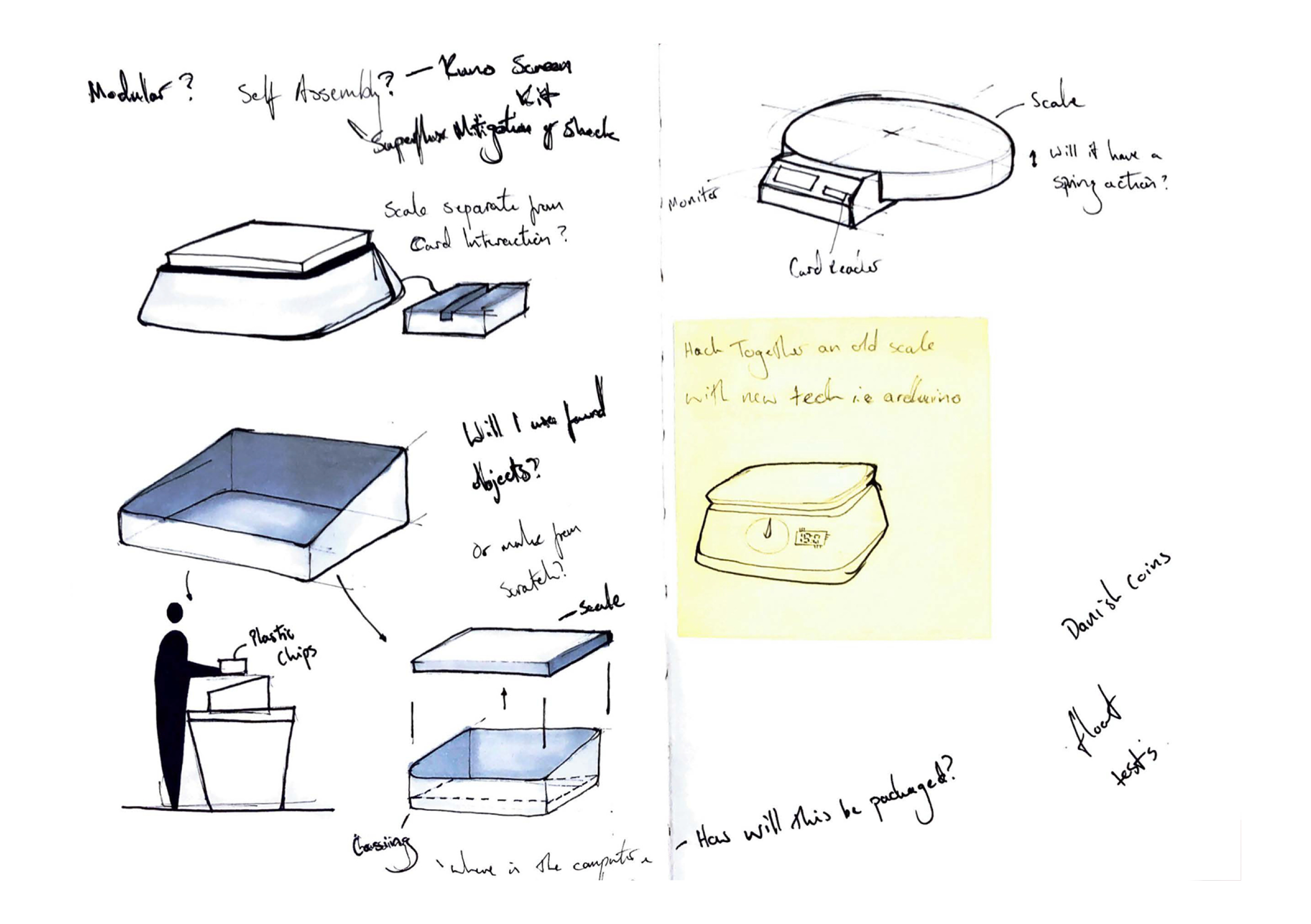
Sketch Models & Renderings





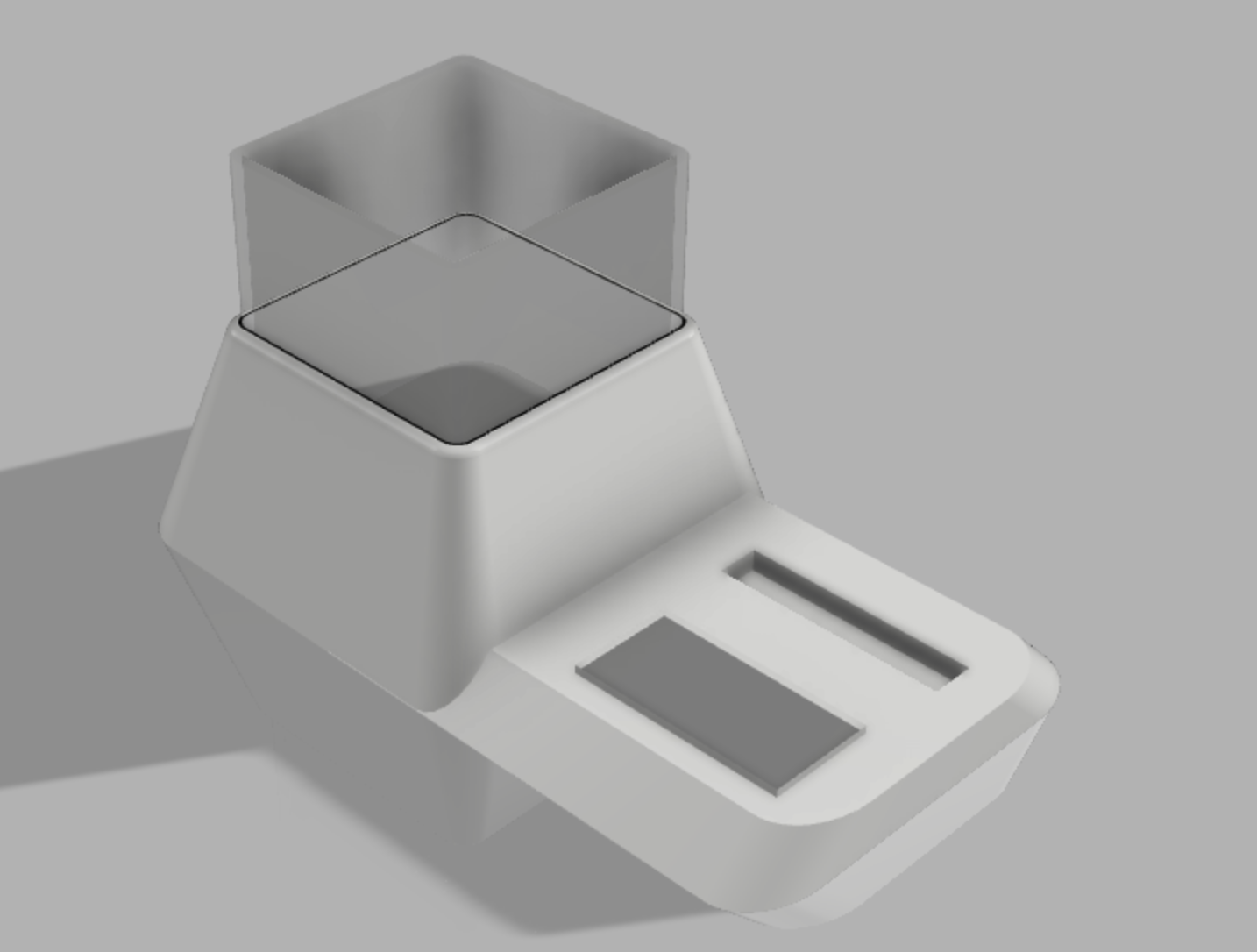
Initial Journey Overview
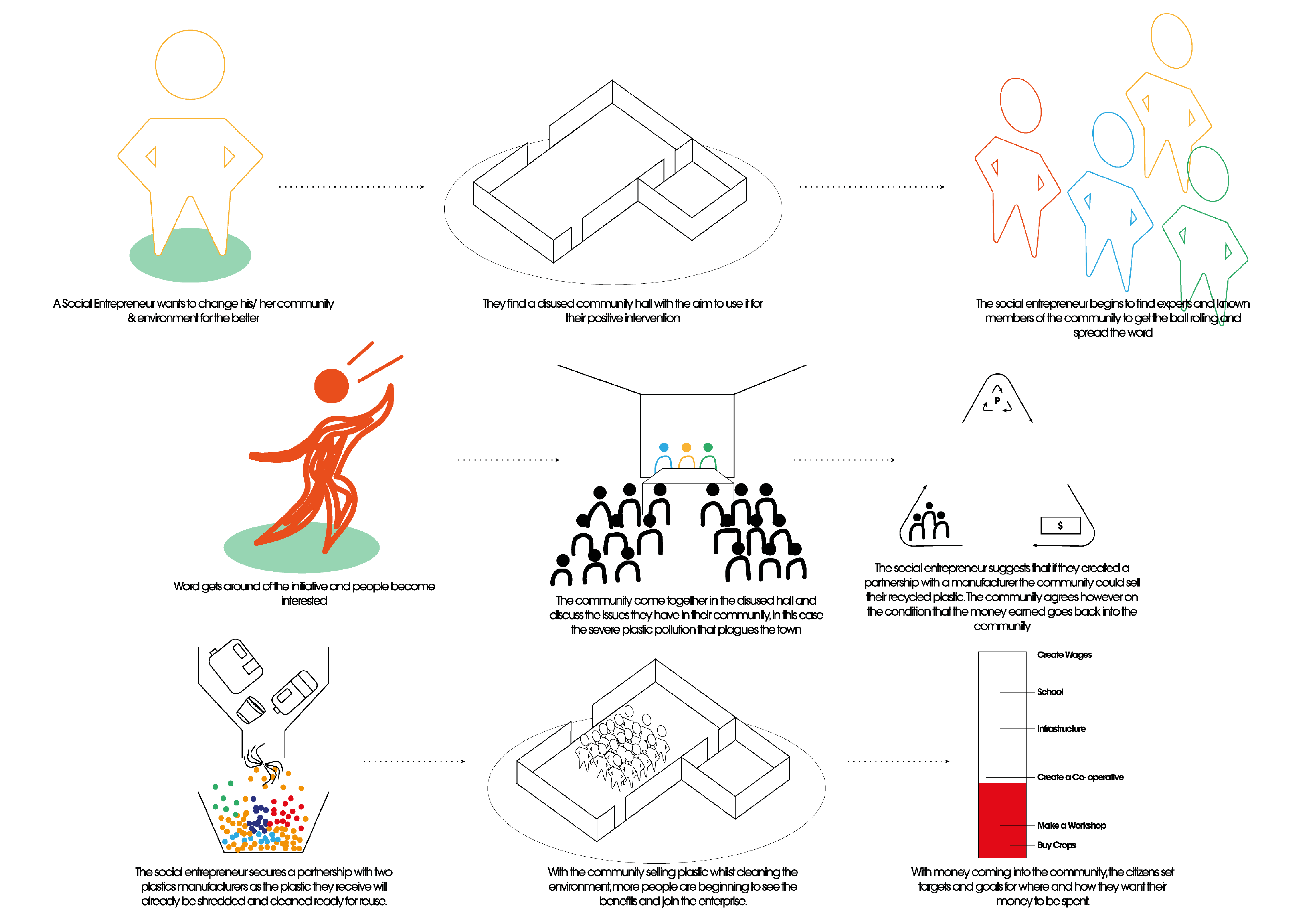

Final Expert Input Session




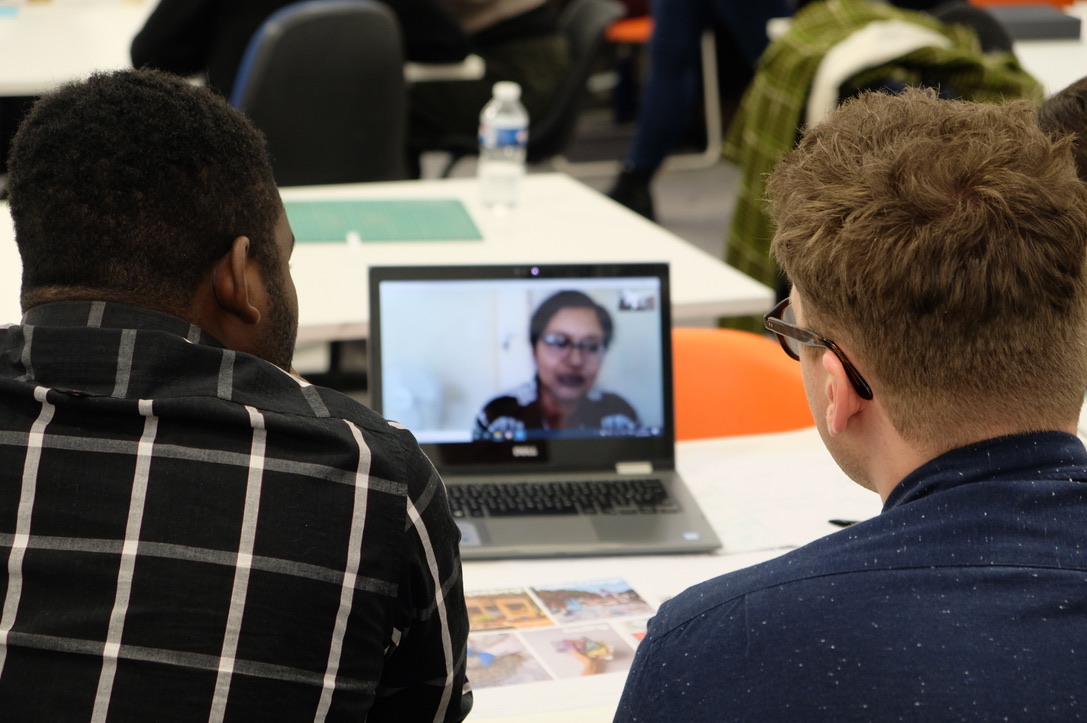
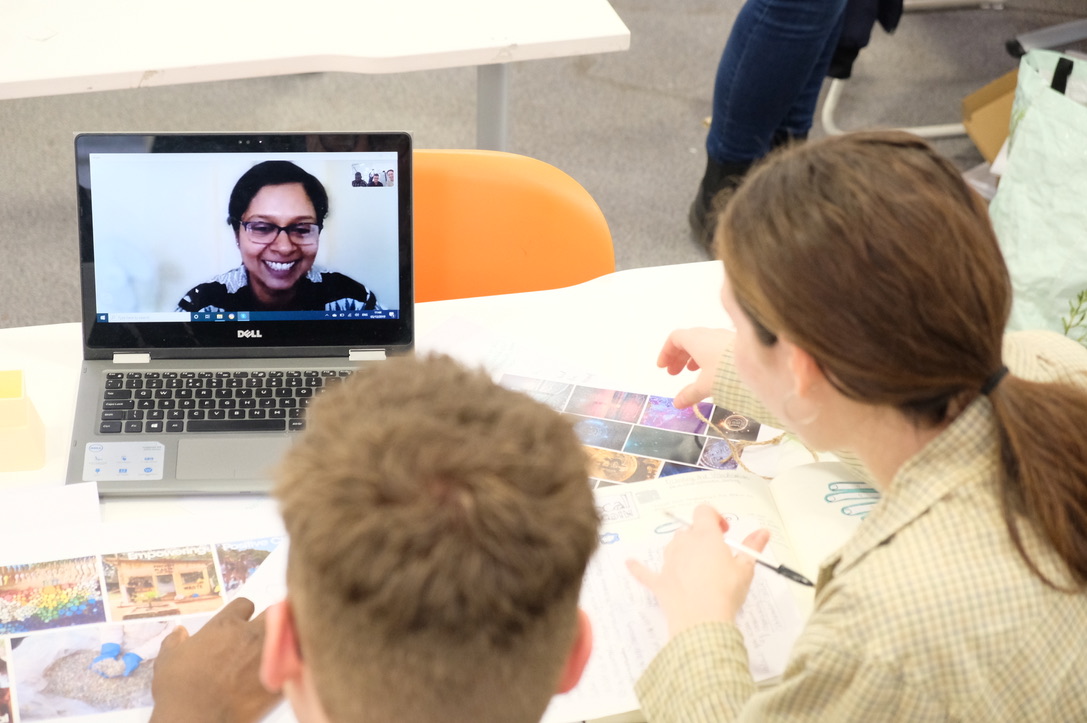
"This is brilliant, we need this!"
- Dr Deepa Pullanikkatil - (Co-Director) of Sustainable Futures in Africa (SFA)
Reflecting on the day
The final expert input day was important as this was the chance to seek detailed feedback on our developed concepts. Fortunately all of he experts agreed that the concept was sound however one stated that there is still an issue on creating incentive however I responded by saying that the concepts outcome itself is enough to create incentive.
In terms of critical feedback I was told to continue my micro analysing of the individuals involved in the concept as that would allow for new touch points to show up. Apart from that the experts would like to see an illustration as to how Plastibank sits within both the Global North and the Global South. Aside from that there was not much to be further developed.
This gave me the confidence to continue with my final developments for the final delivery.
Refinement
After the expert input day I further developed the project and had given a name to further solidify the impact I wanted to create with this intervention. Plastibank seemed a fitting name for this project as it related to the domain I was working under and because of the area it tackled which was plastic recycling and the reduction of plastic pollution.
The following images below include a poster which you would find outside local Plastibank hub's, an overview of Plastibank and its impact on both the Global south and the Global North.


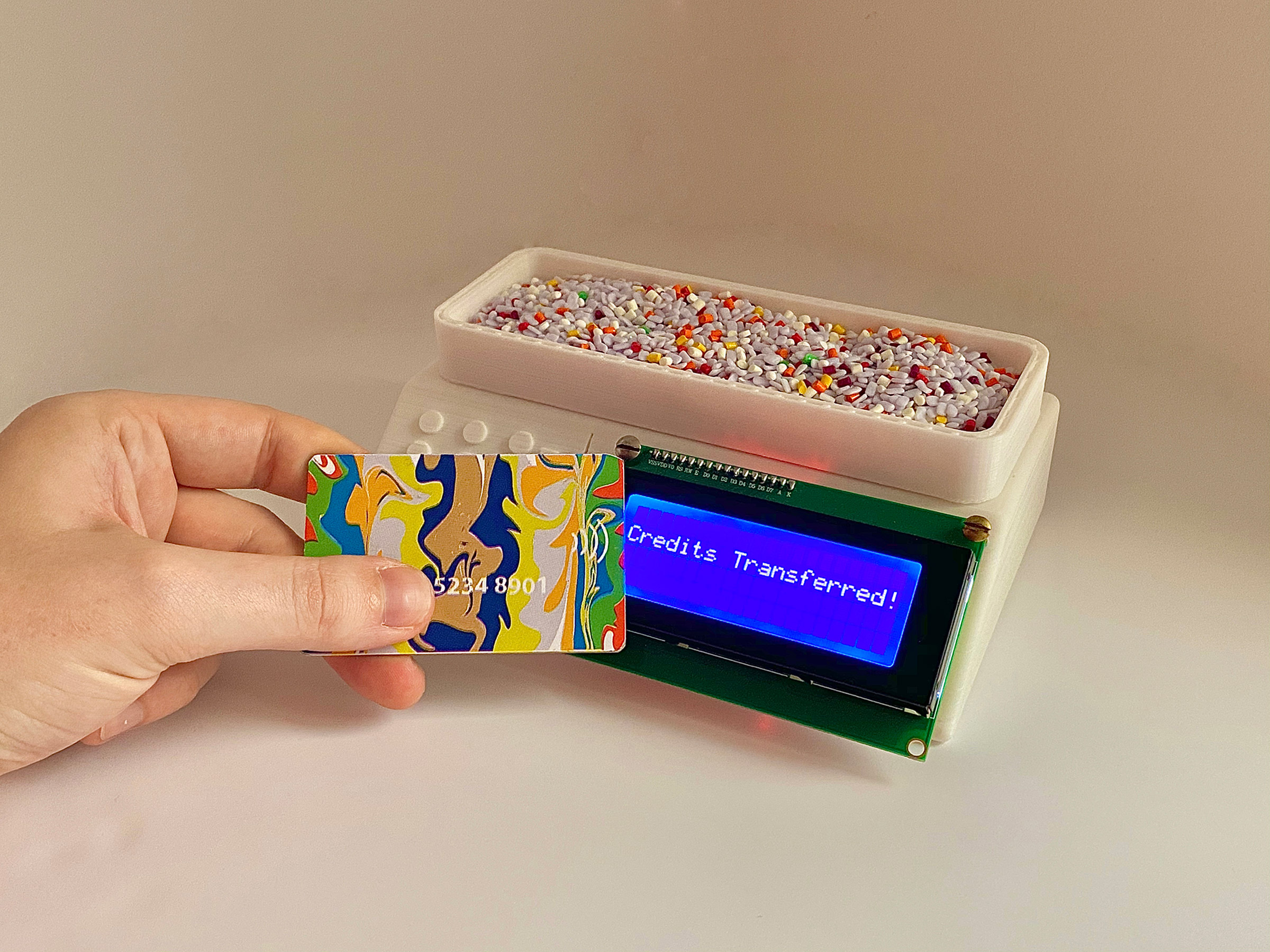
A working prototype of The Exchange machine.
The Exchange Machine allows users to participate in a material stock market where they can deposit their plastic waste and receive financial credit in return.The image shows the moment when the user is transferring the credits they have earned from their deposited plastic.
The New Job Roles in 2030
Material weight is the new economy. The old economic models no longer work,
they were destructive and rife with greed.
they were destructive and rife with greed.
Plastibank is the stepping stone for generational change.
It is more than just a brand, it is a new sustainable way of living.
It is more than just a brand, it is a new sustainable way of living.
Plastibank takes in plastic waste, regardless of its condition, and rewards the plastic collectors or Treasure Hunters financially through a digital bank account for added security.
Plastibank allows the creation of new sustainable job roles that benefit the community and the world.
Plastibank allows the creation of new sustainable job roles that benefit the community and the world.
Plastibank looks to change how we view waste, wealth, the economy and our environment.
Below are just some of the jobs Plastibank has created to rid our world of plastic pollution.
The Freelance Explorer

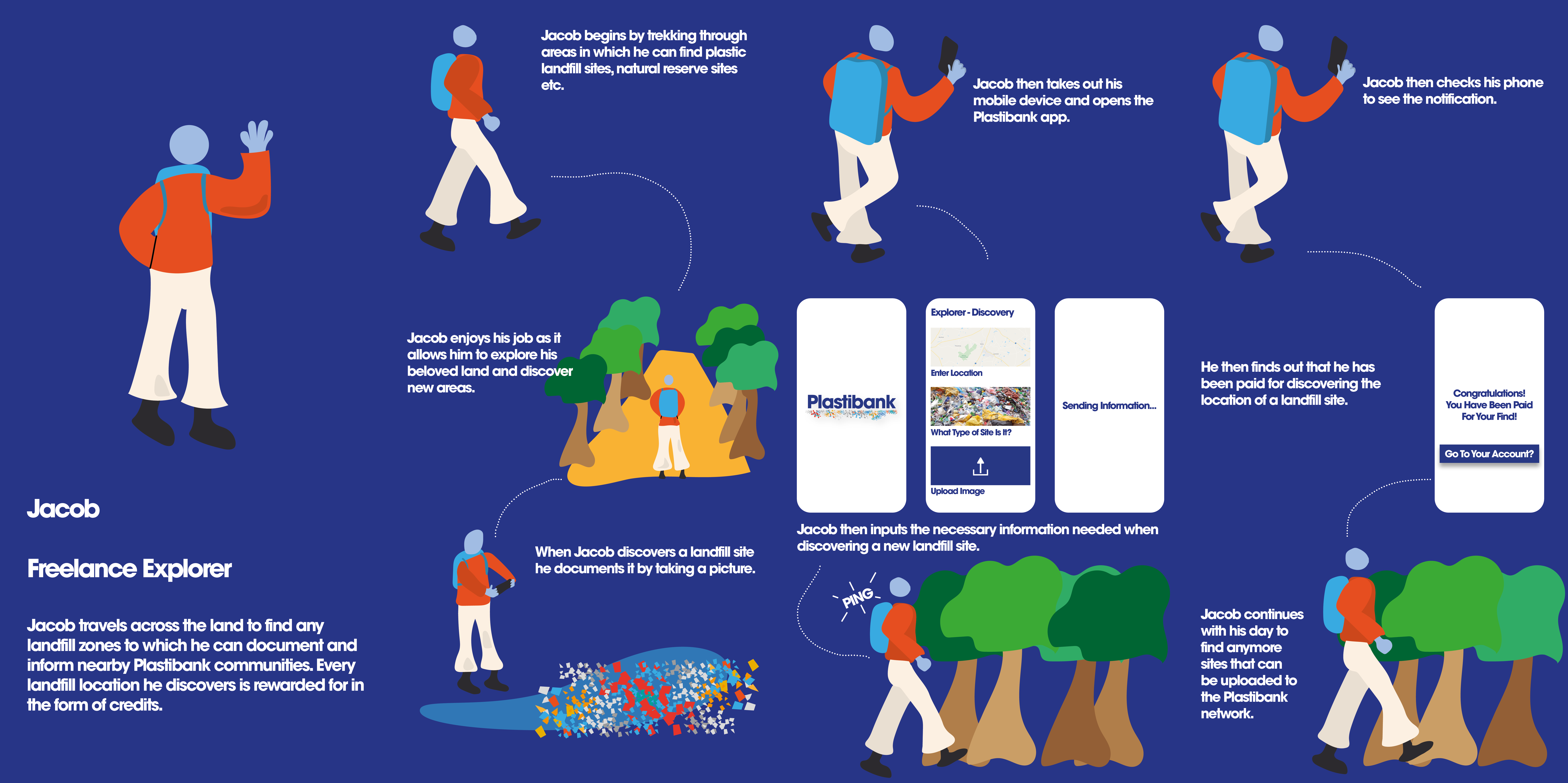

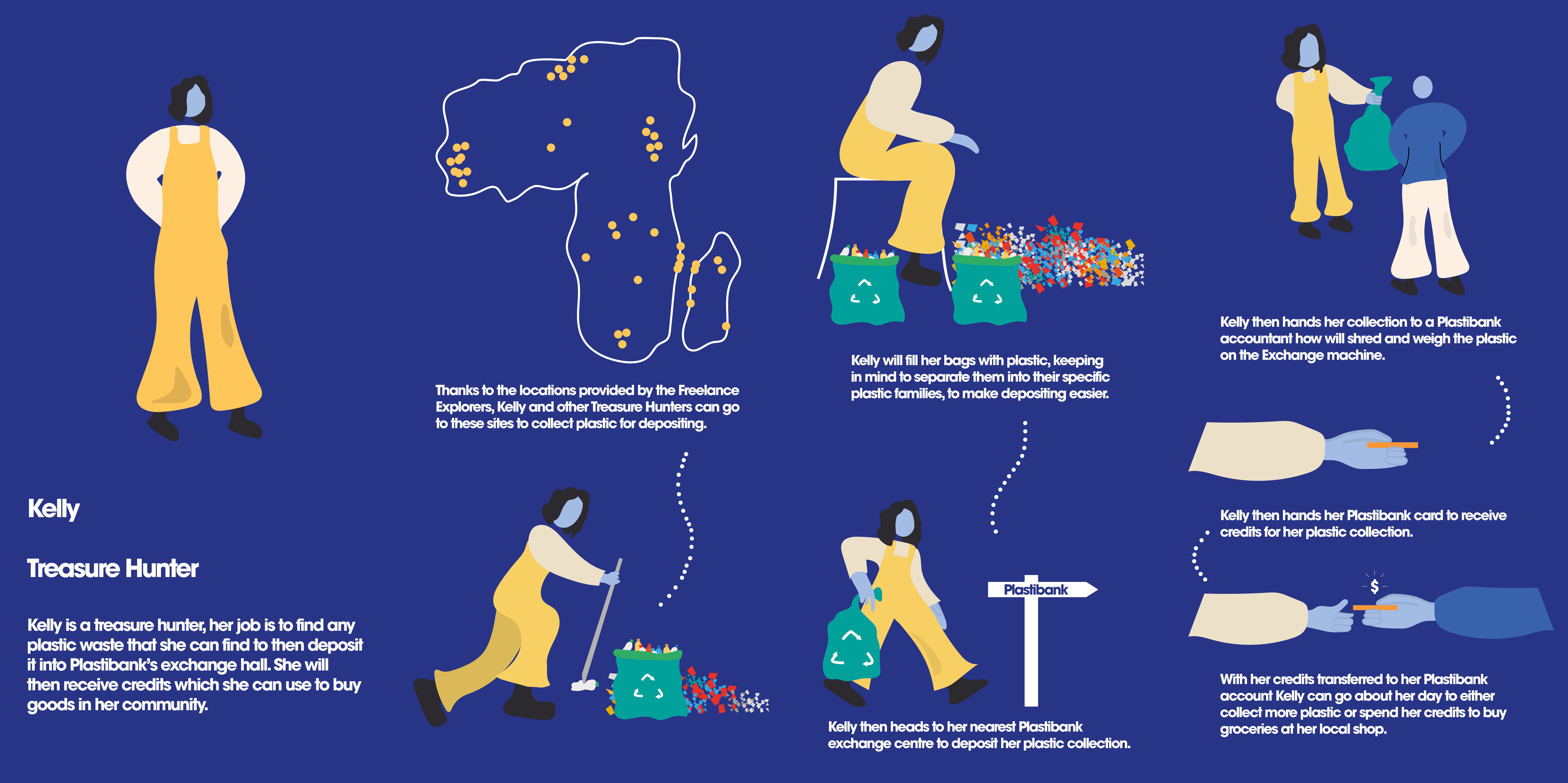
The Treasure Hunter
The Plastic Educator



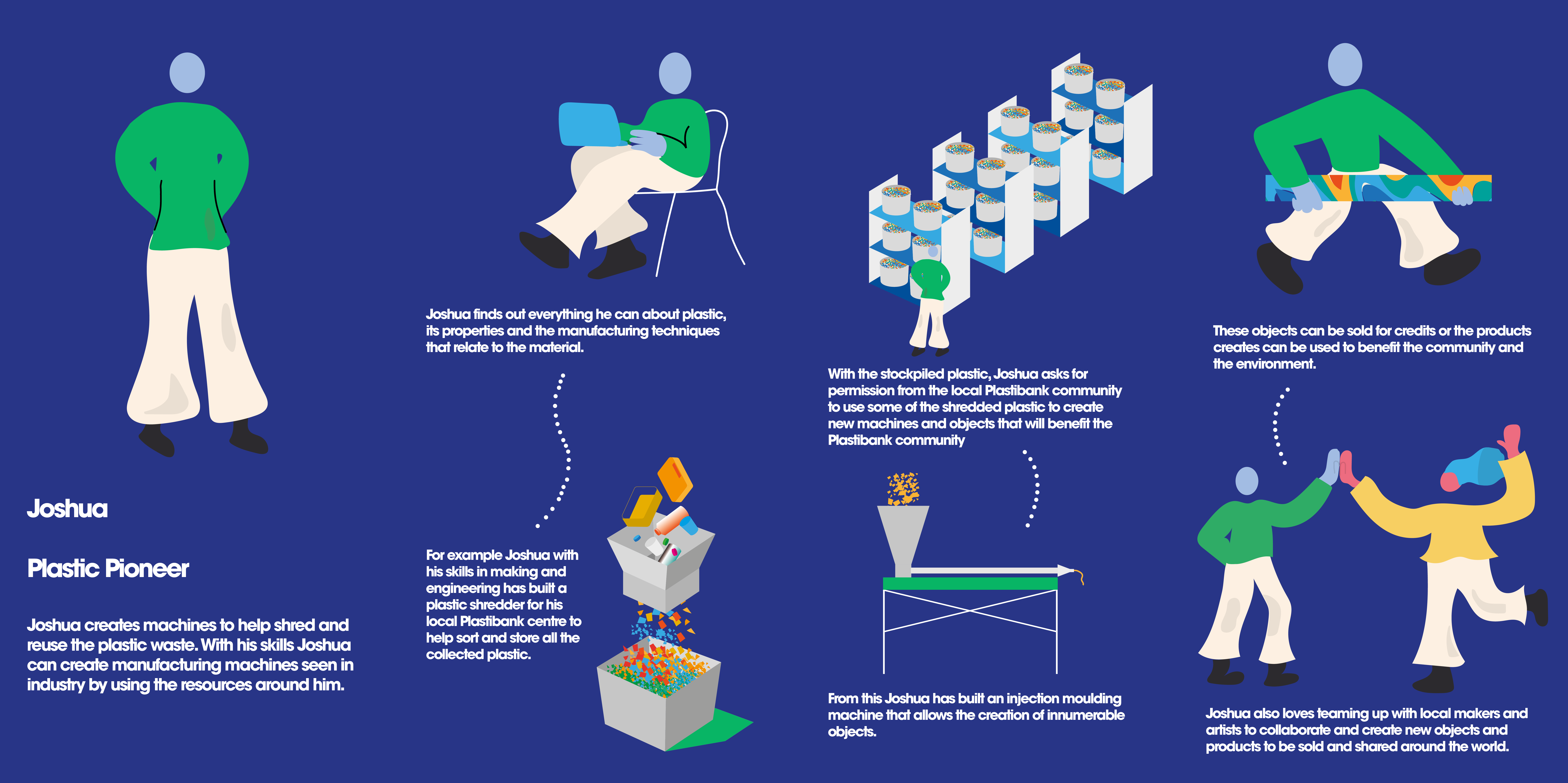
The Plastic Pioneer
WIP Show at the Lighthouse
We ended the project with a WIP show at the Lighthouse, Scotland's centre for design and architecture.
It was a brilliant night as it provided us with the opportunity to show everyone who was and wasn't involved in the project to come and see the future of the Global South in 2029.
The Transient State
Plastibank
Reflection
This project has been the most challenging yet the most rewarding. Getting to meet and work with our partners at the Sustainable Futures in Africa has been a pleasure and it is safe to say that both the Product Design department and the SFA had learned a lot from each other over the course of the three months.
The project has allowed me to expand as a designer in terms of acquiring new skills: from illustrating, rapid model making and taking on more than I thought possible. It is a project that will be the beginning bookend of my design career.
The amount of skills I have learned and the amount of people I have met throughout this project has me looking forward to life after art school.
The amount of skills I have learned and the amount of people I have met throughout this project has me looking forward to life after art school.
If you would like to know more about this project
Drop me an email, lets talk.
--->
c.sferguson25@gmail.com